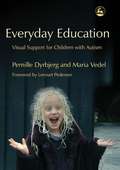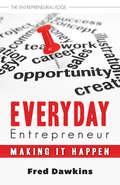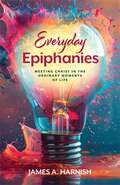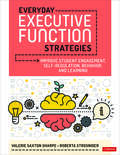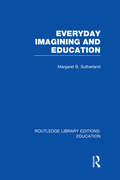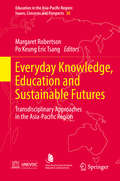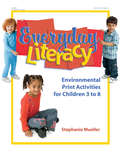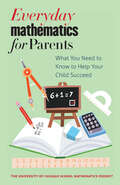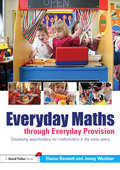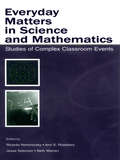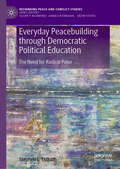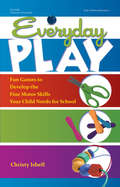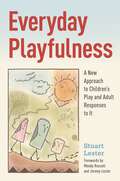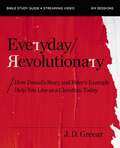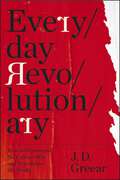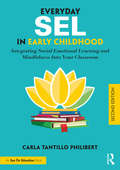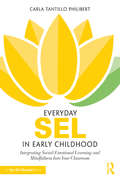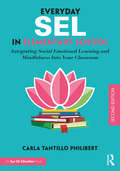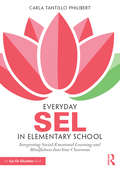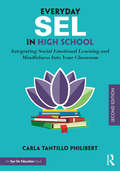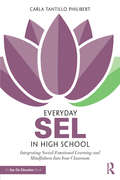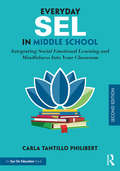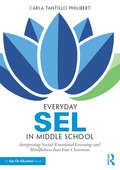- Table View
- List View
Everyday Education: Visual Support for Children with Autism
by Maria Vedel Pernille DyrbjergVisual support aids can be highly effective tools for increasing levels of communication and independence in children with autism, who often have difficulty interpreting spoken language and non-verbal facial expressions. Fully illustrated with inspiring examples, Everyday Education provides a wealth of ideas for creating visual support aids for children on the autism spectrum. Photographs and clear, practical explanations describe how these tools can be arranged helpfully around the home for the child to use. The authors describe how visual support aids can be used in all kinds of everyday situations, from labelling - for example, sticking a picture of a dinner plate with a knife and fork to the chair in which the child sits at meal times - to putting together a pictorial activities schedule for the child to refer to. This fun and encouraging book will be a valuable source of ideas for parents of children with autism and professionals working with them.
Everyday Entrepreneur: Making it Happen
by Fred DawkinsNot a "Dummies" guide on the practical steps of starting a business, Everyday Entrepreneur focuses on the real problems, decisions, and personal qualities of budding entrepreneurs, in the form of an easy-to-read and interesting story. Limited time offer. "The most important skill in the 21st century will be the ability to create your own job." In Everyday Entrepreneur, you will meet three individuals who all have entrepreneurial aspirations. The first is Tim, whose career is stagnating, despite having a good job. Tim has developed some software that could form the basis of his own business, but he can’t make the decision whether or not to set up on his own. Terry, a childhood friend, steers Tim into a class on entrepreneurship conducted by a mysterious person named Sam. The class includes two others: Grace, in her mid-thirties, and Mike, who is twenty-something. Sam invites his three students to learn to become entrepreneurs over a period of twelve days. By focusing on the qualities of a successful entrepreneur and by relying on a wide range of anecdotes, he cleverly leads all three to make important decisions about their future. Fred Dawkins’ practical insights and advice can help you identify your own strengths and empower you to take the leap to an entrepreneur – and make your dream a reality. Watch for Ageless Entrepreneur, arriving May 2015.
Everyday Epiphanies: Meeting Christ in the Ordinary Moments of Life
by James A. HarnishEpiphanies are everywhere.An epiphany is a powerful insight, a revelation that can strike at any moment, in any place, and to anyone. An epiphany enlightens us, provides a deep understanding of reality, and can profoundly impact our lives. Often arising from simple yet impactful experiences, these moments can catch us off guard with a sudden clarity we may have otherwise overlooked. What if these extraordinary moments result from everyday insights that sharpen our ability to see God’s revelations in a new light? In Everyday Epiphanies: Meeting Christ in the Ordinary Moments of Life, James A. Harnish invites you to see the presence of Christ in the everyday moments of our lives. In seven chapters, he takes you through the moments in the gospels where ordinary people experienced the extraordinary revelation of Jesus as the Son of God. As you read this book, you’ll learn to pay attention to the ordinary epiphanies in your own life, the small revelations of Christ that point to God’s dramatic self-revelation to the world.
Everyday Executive Function Strategies: Improve Student Engagement, Self-Regulation, Behavior, and Learning
by Valerie Saxton Sharpe Roberta I. StrosniderEveryday executive function strategies to engage and motivate YOUR students Without a good foundation in executive function skills, many interventions will not be helpful for students experiencing academic and social-emotional challenges. However, explicitly taught metacognitive strategies provide students with the tools to engage and benefit from classroom instruction through the use of an executive function skillset. With an impressive collection of 75 grade-appropriate executive function strategies, this practical guide addresses student needs in areas such as planning, working memory, time management, inhibitory behavior, cognitive flexibility, and self-regulation. Inside, you’ll find the metacognitive strategies shown most effective in facilitating students’ readiness and success in learning, plus Suggestions for incorporating executive function skills into your daily lesson planning and teaching routine without detracting from instructional time A step-by-step manual for explicitly teaching metacognitive skills Grade-level appropriate strategies grouped according to elementary, middle, and high school levels Guidance for adapting strategies to meet a wide range of individual student needs Designed to be applicable to and usable by many educators, from teachers and school psychologists to administrators and school counselors, this toolbox of strategies will help you improve student engagement, self-regulation, behavior, and learning.
Everyday Executive Function Strategies: Improve Student Engagement, Self-Regulation, Behavior, and Learning
by Valerie Saxton Sharpe Roberta I. StrosniderEveryday executive function strategies to engage and motivate YOUR students Without a good foundation in executive function skills, many interventions will not be helpful for students experiencing academic and social-emotional challenges. However, explicitly taught metacognitive strategies provide students with the tools to engage and benefit from classroom instruction through the use of an executive function skillset. With an impressive collection of 75 grade-appropriate executive function strategies, this practical guide addresses student needs in areas such as planning, working memory, time management, inhibitory behavior, cognitive flexibility, and self-regulation. Inside, you’ll find the metacognitive strategies shown most effective in facilitating students’ readiness and success in learning, plus Suggestions for incorporating executive function skills into your daily lesson planning and teaching routine without detracting from instructional time A step-by-step manual for explicitly teaching metacognitive skills Grade-level appropriate strategies grouped according to elementary, middle, and high school levels Guidance for adapting strategies to meet a wide range of individual student needs Designed to be applicable to and usable by many educators, from teachers and school psychologists to administrators and school counselors, this toolbox of strategies will help you improve student engagement, self-regulation, behavior, and learning.
Everyday Imagining and Education (Routledge Library Editions: Education)
by Margaret SutherlandThis book discusses the kind of imaginative thinking which is going on all the time without producing the masterpieces of art and culture. The author brings together the body of educational theory, psychological theory and some general opinions about imagination, to provide an account of everyday imagining for educationalists, psychologists, teachers and parents.
Everyday Inventions (Reach Into Phonics Ser.)
by Deborah J. Short Felix Quintos Gertrude FleckNIMAC-sourced textbook
Everyday Knowledge, Education and Sustainable Futures
by Margaret Robertson Po Keung Eric TsangEveryday knowledge offers opportunities for better understanding of significant issues of our times. Reflecting these themes this book places emphasis on community wisdom. The underpinning argument is that our instinctive urge for survival may not be enough if we do not share our collective knowledge and learn more about the everyday habits, beliefs and actions of communities spread across the region. Contributions from researchers active within local communities help build knowledge capacity and support for collaborative research.
Everyday Literacy: Environmental Print Activities for Young Children Ages 3 to 8
by Stephanie MuellerTeachers can use a collection of cereal boxes and take-out menus as essential literacy tools! The activities in Everyday Literacy integrate environmental print - words, letters, and symbols found in everyday life - into a curriculum that makes it easy to encourage children's literacy every day. Young children develop literacy through direct involvement in meaningful experiences with print. Everyday Literacy provides hands-on ideas for turning newspapers, signs and signals in the community, and catalogs and magazines into literacy experiences. Key features of this book include: Literacy goals to show how concepts of print, letters, and words can be integrated throughout the curriculum. 250 activities to practice developing literacy skills, including writing, comprehension, rhyming words, print awareness, sight word recognition, vocabulary understanding, and letter and letter sound recognition. Activities for making books using environmental print, such as "Seed Packet Pocket Books," a book whose pages children create from seed packet labels. Literacy games, dramatic play materials, building equipment, and interactive bulletin boards. Activities that integrate print into math and science curriculum, such as, "Shopping Bag Addition" and "The Word World of Magnets." Activities in art, fine motor, and music and movement, such as, "Box Front Weaving," "My Name in Lights," and "Cereal Box Hop Scotch." Take-home activities and field trips to places in the community. An appendix with reproducible forms and patterns that can be used in the activities, a checklist of environmental print ideas, and list of children's books that include references to environmental print.
Everyday Mathematics for Parents: What You Need to Know to Help Your Child Succeed
by The University of Chicago School Mathematics ProjectThe Everyday Mathematics (EM) program was developed by the University of Chicago School Mathematics Project (UCSMP) and is now used in more than 185,000 classrooms by almost three million students. Its research-based learning delivers the kinds of results that all school districts aspire to. Yet despite that tremendous success, EMoften leaves parents perplexed. Learning is accomplished not through rote memorization, but by actually engaging in real-life math tasks. The curriculum isn’t linear, but rather spirals back and forth, weaving concepts in and out of lessons that build overall understanding and long-term retention. It’s no wonder that many parents have difficulty navigating this innovative mathematical and pedagogic terrain. Now help is here. Inspired by UCSMP’s firsthand experiences with parents and teachers, Everyday Mathematics for Parents will equip parents with an understanding of EM and enable them to help their children with homework—the heart of the great parental adventure of ensuring that children become mathematically proficient. Featuring accessible explanations of the research-based philosophy and design of the program, and insights into the strengths of EM, this little book provides the big-picture information that parents need. Clear descriptions of how and why this approach is different are paired with illustrative tables that underscore the unique attributes of EM. Detailed guidance for assisting students with homework includes explanations of the key EM concepts that underlie each assignment. Resources for helping students practice math more at home also provide an understanding of the long-term utility of EM. Easy to use, yet jam-packed with knowledge and helpful tips, Everyday Mathematics for Parents will become a pocket mentor to parents and teachers new to EM who are ready to step up and help children succeed. With this book in hand, you’ll finally understand that while this may not be the way that you learned math, it’s actually much better.
Everyday Maths through Everyday Provision: Developing opportunities for mathematics in the early years
by Elaine Bennett Jenny WeidnerChildren are born naturally mathematical, so why is it sometimes so difficult to observe children being mathematical? Why do so many of us think we are ‘bad’ at maths and how does this subconsciously affect the provision, experiences and opportunities we provide for young children who are starting their mathematical learning journey? This easily accessible book will help you to realise the wonderful mathematical learning happening in your setting all day and every day through the familiar resources and experiences routinely offered to young children. It will help you to think more reflectively about what you are providing for children and suggest ways of making provision richer and more exciting for you and the children in your care. With chapters linked to areas of continuous provision including sand, water, dough, role play, music, outdoors and ICT among many others, this book features: A wide range of activities including key questions, vocabulary and advice on observations Lists of key resources Ideas to support children’s mathematical mark making Useful links to stories and rhymes to engage children and promote mathematical learning Links to other areas of learning and development Suggestions for involving parents Providing a wealth of exciting, meaningful, play-based ways to promote mathematical learning and create a maths rich environment, this highly practical book will help you to develop young children’s confidence and enjoyment of maths through your everyday provision. It is a perfect resource for Early Years Practitioners working in all settings, as well as those studying on childcare, Early Childhood and Early Years Professional Status courses.
Everyday Matters in Science and Mathematics: Studies of Complex Classroom Events
by Beth Warren Ricardo Nemirovsky Ann S. Rosebery Jesse SolomonThis book re-examines the dichotomy between the everyday and the disciplinary in mathematics and science education, and explores alternatives to this opposition from points of view grounded in the close examination of complex classroom events. It makes the case that students' everyday experience and knowledge in their entire manifold forms matter crucially in learning sciences and mathematics. The contributions of 13 research teams are organized around three themes: 1) the experiences of students in encounters with everyday matters of a discipline; 2) the concerns of curriculum designers, including teachers, as they design activities intended to focus on everyday matters of a discipline; and 3) the actions of teachers as they create classroom encounters with everyday matters of a discipline.As a whole the volume reflects the shift in the field of educational research in recent years away from formal, structural models of learning toward emphasizing its situated nature and the sociocultural bases of teaching and learning. At least two trends--increasing awareness that formal theories can be useful guides but are always partial and provisional in how they disclose classroom experiences, and the widespread availability of video and audio equipment that enables effortless recording of classroom interactions--have reoriented the field by allowing researchers and teachers to look at learning starting with complex classroom events rather than formal theories of learning. Such examinations are not meant to replace the work on general theoretical frameworks, but to ground them in actual complex events. This reorientation means that researchers and teachers can now encounter the complexity of learning and teaching as lived, human meaning-making experiences. Immersion in this complexity compels rethinking assumptions about the dichotomies that have traditionally organized the field's thinking about learning. Further, it has important implications for how the relationship between theory and practice in understanding teaching and learning is viewed.Everyday Matters in Science and Mathematics: Studies of Complex Classroom Events is an important resource for researchers, teacher educators, and graduate students in mathematics and science education, and a strong supplemental text for courses in these areas and also in cognition and instruction and instructional design.
Everyday Peacebuilding through Democratic Political Education: The Need for Radical Poise (Rethinking Peace and Conflict Studies)
by Stephen L. EsquithEveryday peacebuilding through democratic political education is a necessary but not sufficient condition for limiting negative political emotions such as anger, fear, and resentment, and for cultivating the political virtues needed for an alternative, more democratic orientation towards power: one that values and exercises power with other members of emergent political communities, not power over them. These demotic political virtues include self-restraint, resistance, humility, respect for the civic dignity of others, non-violent protest, and the radical poise needed to cultivate and coordinate this constellation of political virtues. For those who have been forcibly displaced or are only dimly aware of their complicity in this type of political violence, to maintain a radically poised stance is a continuing process of democratic political education. This book demonstrates how this notion of Radical Poise in theory and practice can be developed through a hybrid process of political education in one country, Mali, to contest the growth of violence and fear there and elsewhere.
Everyday Play: Fun Games to Develop the Fine Motor Skills Your Child Needs for School
by Christy IsbellDevelop the fine motor skills your child needs for school success! Fine motor skills are a stepping-stone for school readiness, and Everyday Play gives you the tools you need to make developing those skills easy and fun! Organized by age for easy reference, the dozens of creative activities in Everyday Play are inexpensive, require few or no materials, and are easy to do with your child. Best of all, they give you and your child great ways to have fun while laying the foundation for important fine motor skills that your child needs for school. Activities include: * No-Mess Finger Painting * Marble Painting * Racing Tracks * Squeezy Water Play * Graph Paper Art * Water Droppers Holding a pencil, drawing a line, zipping a coat-- Everyday Play helps your child accomplish all these milestones and more. With a chapter of frequently asked questions from real parents, developmental guidelines, and easy strategies for teaching your child important skills, Everyday Play is the book you need to ensure your child is ready for school.
Everyday Playfulness: A New Approach to Children’s Play and Adult Responses to It
by Stuart LesterSeeing play as an important and vital element of life for children and adults alike, this book addresses the ways in which practitioners take account of and act responsibly with moments of children's play and playfulness.Working with the Playwork Principles, the book draws on alternative concepts to traditional approaches, including ideas from materialist and posthuman philosophy and human geography, to explore playing as process rather than product. Topics covered include play and wellbeing, play and space, and the micro-politics of playing, critical cartography and adult account-ability and response-ability. It concludes by considering the implications for professional practice and offering ways that professionals can develop practices that maintain and co-create favourable conditions in which children's play can flourish.
Everyday Revolutionary Bible Study Guide plus Streaming Video: How Daniel's Story and Peter's Example Help You Live as a Christian Today
by J.D. GreearLiving quietly for God and speaking your faith loudlyHave you felt the tension between living faithfully as a Christian and navigating an increasingly complex cultural landscape? Perhaps you've found yourself wrestling with questions that seem to have no clear answers. Questions such as . . .When should you speak up and when should you stay silent?How can you show love to your neighbors while standing firm in your convictions?What does it mean to be both gracious and truthful in a world that often sees these as mutually exclusive?Join pastor J. D. Greear as he answers these questions by looking at the life of Daniel—a Jewish man who was distinctively faithful yet genuinely beloved in the culture of Babylon—and at the writings of Peter and other New Testament authors, who used Babylon as a metaphor for the secular world after Jesus' ascension. In the process, you will discover what it means to "live quietly" in this world while "testifying loudly" for Christ—whether that is in in your workplace, children's school, neighborhood, or even on social media.This study guide includes:Individual access to six streaming video sessionsVideo notes and comprehensive structure for group discussion timePersonal study for deeper reflection between sessionsA guide to best practices for leading a groupWatch on any device!Streaming video access included. Access code subject to expiration after 12/31/2030. Code may be redeemed only by the recipient of this package. Code may not be transferred or sold separately from this package. Internet connection required. Eligible only on retail purchases inside the United States. Void where prohibited, taxed, or restricted by law. Additional offer details inside.
Everyday Revolutionary: How to Transcend the Culture War and Transform the World
by J.D. GreearTired of being a pawn in the culture war? Feeling squeezed between political and theological extremes? In this practical and encouraging book, you can discover biblical insights for witnessing well in our polarized, post-Christian world.Radical ideologies leave many of us in exile. How do we live faithfully when we don't feel at home in this increasingly secular culture?In Everyday Revolutionary, pastor and Bible teacher J. D. Greear calls us to reimagine our Christian witness in today's world. Written for those of us who feel like outsiders in this new era, Everyday Revolutionary draws on the story of Daniel to help us "live sent" right where we are. This Christian guide to "living quietly but testifying loudly" helps us:Get excited about sharing the Good News with colleagues and friendsFind the courage to face opposition from all political extremesTake inspiration from Scripture on how to minister in modern BabylonsDiscover core practices that strengthen faith under fire In this fraught cultural moment, you can be an everyday revolutionary who stands up for the truth of the gospel. After all, the God who shuts the mouths of lions placed you in this time for a reason. You might just decide you wouldn't trade it for the world.
Everyday SEL in Early Childhood: Integrating Social Emotional Learning and Mindfulness Into Your Classroom
by Carla Tantillo PhilibertWith this bestselling book from educational consultant Carla Tantillo Philibert, you’ll gain practical strategies for teaching Social Emotional Learning (SEL), mindfulness, and well-being to help improve the human connection between you and your students. You’ll find out how to lead students through mindfulness activities, simple yoga poses, and breath-work techniques. Topics include mindful practices, well-being strategies to combat stress and anxiety, giving your students the space to understand their emotions and strengthen peer-to-peer communication, developing the foremost and essential SEL competencies, and engaging in experiential activities to strengthen SEL skills. The new edition reflects the latest CASEL guidelines and includes updated activities, as well as a brand-new directory of terms, and an intentional focus on educators’ and students’ socio-emotional well-being. Perfect for early childhood educators at any level of experience, the book will help you develop positive youth identity and promote connectedness so students can deal successfully with life’s stressors beyond school doors.
Everyday SEL in Early Childhood: Integrating Social-Emotional Learning and Mindfulness Into Your Classroom
by Carla Tantillo PhilibertWith this new book from educational consultant Carla Tantillo Philibert, you’ll gain practical strategies for teaching Social-Emotional Learning (SEL), mindfulness, movement, and team-building to help your students grow into contributing and compassionate citizens of the world. You’ll find out how to lead students through meditation activities, simple yoga poses, breathing techniques, and other practical methods to help you proactively manage your classroom by meeting your students’ SEL needs. Topics include: • Empowering your students to understand their emotions, improve their focus, manage stress, and regulate their behavior • Introducing your students to the concept of mindfulness and how it fits within the SEL framework • Crafting an emotionally, physically, and mentally safe classroom climate and culture • Engaging your students in activities to strengthen peer-to-peer communication, community-building, and leadership skills • Providing your students the safe space to test their SEL skills through experiential learning, team work, and class discussions • Honing your own SEL competency through professional development so both you and your students can get the most out of your school’s SEL experience This book also offers a set of Professional Development Facilitator’s Guides to help you and your colleagues master the core competencies of SEL and implement them effectively across your school or district. The appendix provides additional strategies for teaching personal space, Safe Touch, and making mindful accommodations for students who have experienced trauma.
Everyday SEL in Elementary School: Integrating Social Emotional Learning and Mindfulness Into Your Classroom
by Carla Tantillo PhilibertWith this bestselling book from educational consultant Carla Tantillo Philibert, you’ll gain practical strategies for teaching Social Emotional Learning (SEL), mindfulness, and well-being to help improve the human connection between you and your students. You’ll find out how to lead students through mindfulness activities, simple yoga poses, and breath-work techniques. Topics include mindful practices, well-being strategies to combat stress and anxiety, giving your students the space to understand their emotions and strengthen peer-to-peer communication, developing the foremost and essential SEL competencies, and engaging in experiential activities to strengthen SEL skills. The new edition reflects the latest CASEL guidelines and includes updated activities, as well as a brand-new directory of terms, and an intentional focus on educators’ and students’ socio-emotional well-being. Perfect for elementary school educators at any level of experience, the book will help you develop positive youth identity and promote connectedness so students can deal successfully with life’s stressors beyond school doors.
Everyday SEL in Elementary School: Integrating Social-Emotional Learning and Mindfulness Into Your Classroom
by Carla Tantillo PhilibertIn this new book from educational consultant Carla Tantillo Philibert, you’ll gain practical strategies for teaching social-emotional learning (SEL), mindfulness, and movement to help your elementary students maintain positive relationships, assume responsibility, become bodily aware, and grow into productive, contributing citizens. You’ll find out how to lead students through games, simple yoga poses, breathing techniques, and other activities that are easy to incorporate and help you manage your classroom. Topics include: Empowering your students to understand their emotions, improve their focus, manage stress, and regulate their behavior through structured activities Introducing your students to the concept of SEL and setting up your own SEL classroom Engaging your students in activities to strengthen peer-to-peer communication, community-building, and leadership skills Allowing your students to test their SEL skills through interactive stories and class discussions Honing your own SEL competency through professional development sessions so your students can get the most out of their SEL experience The book also offers a Professional Development Facilitator’s Guide to help you and your colleagues master the core concepts of SEL and implement them effectively in the classroom. The appendix provides additional strategies for overcoming common difficulties when first beginning your school’s SEL journey.
Everyday SEL in High School: Integrating Social Emotional Learning and Mindfulness Into Your Classroom
by Carla Tantillo PhilibertWith this bestselling book from educational consultant Carla Tantillo Philibert, you’ll gain practical strategies for teaching Social Emotional Learning (SEL), mindfulness, and well-being to help improve the human connection between you and your students. You’ll find out how to lead students through mindfulness activities, simple yoga poses, and breath-work techniques. Topics include mindful practices, well-being strategies to combat stress and anxiety, giving your students the space to understand their emotions and strengthen peer-to-peer communication, developing the foremost and essential SEL competencies, and engaging in experiential activities to strengthen SEL skills. The new edition reflects the latest CASEL guidelines and includes updated activities, as well as a brand-new directory of terms, and an intentional focus on educators’ and students’ socio-emotional well-being. Perfect for high school educators at any level of experience, the book will help you develop positive youth identity and promote connectedness so students can deal successfully with life’s stressors beyond school doors.
Everyday SEL in High School: Integrating Social-Emotional Learning and Mindfulness Into Your Classroom
by Carla Tantillo PhilibertWith this new book from educational consultant Carla Tantillo Philibert, you’ll gain practical strategies for teaching Social-Emotional Learning (SEL), mindfulness, movement, and team-building to help your students grow into contributing and compassionate citizens of the world. You’ll find out how to lead students through meditation activities, simple yoga poses, breathing techniques, and other practical methods to help you proactively manage your classroom by meeting your students’ SEL needs. Topics include: Empowering your students to understand their emotions, improve their focus, manage stress, and regulate their behavior Introducing your students to the concept of mindfulness and how it fits within the SEL framework Crafting an emotionally, physically, and mentally safe classroom climate and culture Engaging your students in activities to strengthen peer-to-peer communication, community-building, and leadership skills Providing your students the safe space to test their SEL skills through experiential learning, team work, and class discussions Honing your own SEL competency through professional development so both you and your students can get the most out of your school’s SEL experience This book also offers a set of Professional Development Facilitator’s Guides to help you and your colleagues master the core competencies of SEL and implement them effectively across your school or district. The appendix provides additional strategies for teaching personal space, Safe Touch, and making mindful accommodations for students who have experienced trauma.
Everyday SEL in Middle School: Integrating Social Emotional Learning and Mindfulness Into Your Classroom
by Carla Tantillo PhilibertWith this bestselling book from educational consultant Carla Tantillo Philibert, you’ll gain practical strategies for teaching Social Emotional Learning (SEL), mindfulness, and well-being to help improve the human connection between you and your students. You’ll find out how to lead students through mindfulness activities, simple yoga poses, and breath-work techniques. Topics include mindful practices, well-being strategies to combat stress and anxiety, giving your students the space to understand their emotions and strengthen peer-to-peer communication, developing the foremost and essential SEL competencies, and engaging in experiential activities to strengthen SEL skills. The new edition reflects the latest CASEL guidelines and includes updated activities, as well as a brand-new directory of terms, and an intentional focus on educators’ and students’ socio-emotional well-being. Perfect for middle school educators at any level of experience, the book will help you develop positive youth identity and promote connectedness so students can deal successfully with life’s stressors beyond school doors.
Everyday SEL in Middle School: Integrating Social-Emotional Learning and Mindfulness Into Your Classroom
by Carla Tantillo PhilibertIn this new book from educational consultant Carla Tantillo Philibert, you’ll gain practical strategies for teaching social-emotional learning (SEL), mindfulness, and movement to help your middle school students maintain positive relationships, assume responsibility, become bodily aware, and grow into productive, contributing citizens. You’ll find out how to lead students through games, simple yoga poses, breathing techniques, and other activities that are easy to incorporate and help you manage your classroom. Topics include: Empowering your students to understand their emotions, improve their focus, manage stress, and regulate their behavior through structured activities Introducing your students to the concept of SEL and setting up your own SEL classroom Engaging your students in activities to strengthen peer-to-peer communication, community-building, and leadership skills Allowing your students to test their SEL skills through interactive stories and class discussions Honing your own SEL competency through professional development sessions so your students can get the most out of their SEL experience The book also offers a Professional Development Facilitator’s Guide to help you and your colleagues master the core concepts of SEL and implement them effectively in the classroom. The appendix provides additional strategies for overcoming common difficulties when first beginning your school’s SEL journey.
